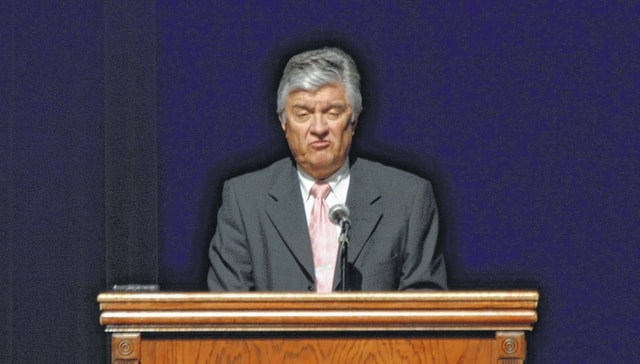



WILMINGTON — A 16-speaker forum on Ohio’s opiate epidemic shared ideas for solutions and insights into the pervasive problems caused by opiates, mostly heroin.
The problems are many and well-known.
Almost half of Clinton County Prosecutor Rick Moyer’s felony cases since January 2015 involve drugs.
Drug cartels operate in well-funded, matrixed, paramilitary organizations “in your neighborhood,” Ohio Bureau of Criminal Investigation agent Richard Miller said.
Wilmington became the center of a “media frenzy” after more people overdosed in the first few days of 2016 than in the first three months of 2015, Wilmington Police Department’s Sgt. Ron Fithen said.
Addicts smuggle drugs into the Clinton County Jail, so they can get high one or two more times, said Col. Brian Prickett, of the Clinton County Sheriff’s Office.
More life squads are making more runs to dispense Narcan, according to Mike Jones, Clinton County Emergency Management Agency director.
And more children are being “born addicted to drugs,” entering foster care or dying in the womb, according to Heather Gibson.
“We cannot sweep this issue under the rug,” Gibson said. “We’re tripping over it.”
“We’re all ready for solutions,” said Carol Baden, community outreach director for Ohio Attorney General Mike DeWine.
Bader said the forum was organized to share “ideas that work” – those done elsewhere and here.
“This epidemic has no boundaries,” she said. “We’re all in this together.”
From Ohio-based pill mills to cartel-linked heroin, Baden said the opiate epidemic began with pills, and she said studies show as many as 80 percent of heroin users began with legitimate pain prescriptions.
“That idea in your head that this is a population that they got themselves into it, it’s their problem,” Baden said, “I would say let’s start changing the language.”
Many of the local commenters were a part of the criminal justice system and spoke about how addicts are also victims, the need for legislative changes and the evolving role of law enforcement officials.
The Wilmington Police Department’s Fithen said officers have to see themselves as “change agents” for addicts.
“This is a disease,” Fithen said. “This is a monster that these people are facing. … We have to be a change agent for these people that are facing this monster.”
Fithen said officers need to be educated to help facilitate that change.
“We’re the ones dealing with the family members,” doing CPR and taking children to a different room, he said. “We have to create change somehow. We have to be able to create two-way communication with our addicts, with the victims that are facing this monster.”
In addition to enforcing laws, the Clinton County Sheriff’s Office, Prickett said, collaborates with state and local agencies to combat the epidemic, finding ways to help families fight addiction and offering education, like DARE programs.
Clinton County Court of Common Pleas Judge John W. “Tim” Rudduck argued in favor of de-criminalizing and de-stigmatizing addiction.
“We can send them to prison, we can send them to jail, we can send them to programming, and we do,” Rudduck said. “But, unless we deal with the complex, multiple problems a lot of these folks have” including an addict’s environment, education and employment, it will continue.”
Moyer and Blanchester Police Chief Scott Reinbolt called for legislative changes to send drug dealers away for longer.
“You wouldn’t have an addict if you didn’t have someone who was willing to sell,” Moyer said. “As long as people are willing to take the risk for the money, they’ll do it.”
Reinbolt said he was once wrong to believe incarceration was the solution, but he said state officials are wrong if they believe treatment is the only solution.
Miller called on community residents to report crimes to their local law enforcement agencies, even anonymous tips.
At its peak, just under 100 people showed up to hear those and other ideas. Audience members included law enforcement, healthcare and nonprofit officials from municipalities, Clinton County and the region as well as community members.
Two of those community members were fed-up parents.
Jim Landon said the forum was informative, and it inspired him to have hope for Clinton County.
“His (Rudduck’s) compassion for the addict” particularly struck Landon. “He recognizes that the addict is a victim.”
Landon said he, too, has a child addicted to a drug and recovering from that addiction.
“Through my frustrations in obtaining treatment for him … I have vowed to be an advocate for the victims of drugs and alcohol” after his upcoming retirement,” Landon said. “The facilities that we have in Clinton County are grossly understaffed, underfunded and overworked.”
“I have a daughter in prison because of heroin,” said Judy Elam. “She’ll be getting out hopefully around December, and I want to see what programs are available so that she does not end up back there. See if there’s anything available for them, which is one thing I think they’re lacking in.”
Elam said her daughter has seen people leave prison and come back in a few years after relapsing.
“I think that some good things are going to be happening in Clinton County,” said Elam. “Hopefully in Columbus some laws are going to be changed, so the addict is not the one that’s punished more than the dealer.”
At the same time, Elam agreed with Rudduck, who said it’s time to de-criminalize heroin addiction.
One of the speakers was also a parent.
Beth Bullock, of Brave Choices, said she and her husband began the organization when their son died of an overdose. Now, it offers packets of information for police to carry and give to families after a reported overdose.
That packet contains resources and instructions for a number of scenarios, including what to do when a loved one survives an overdose.
A separate packet explains what to do when a loved one doesn’t survive an overdose.
Both packets can be found on the News Journal’s website, attached to the web version of this story.
Reach Nathan Kraatz at 937-382-2574, ext. 2510 or on Twitter @NathanKraatz.





